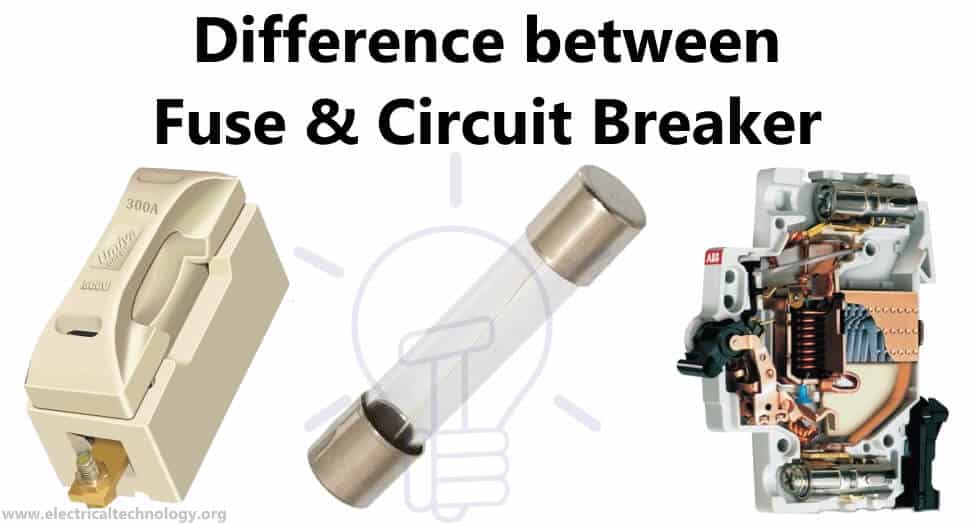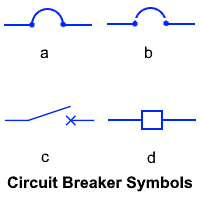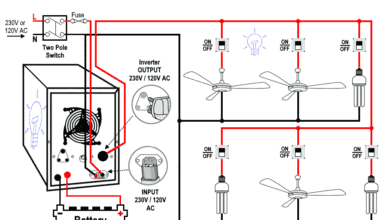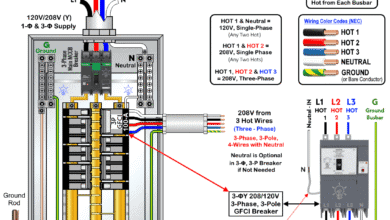Main Difference between Fuse and Circuit Breaker
What is the Difference between Fuse and Circuit Breaker
A fuse is a device, which is used to protect circuits from over current, overload and make sure the protection of the circuit. It is made of porcelain, glass or porcelain. The fuse link or fuse element is a thing metal strip made up of Copper, Silver, Aluminum, Zinc, or alloys. When overload occurs, the fuse element starts to melt immediately and break the connected circuit from the incoming supply. Thus, it protects the whole circuit.
- Related Post: Difference Between a Battery and a Capacitor
A Circuit breaker is a device which control (make or break) a circuit automatically, manually or by remote control under normal and fault conditions like over current, Short circuit, etc. In circuit breaker, electromechanical switch and relay mechanism trip the circuit when an unsafe value of current (overload or short circuit) attempts to flow in the circuit connected through circuit breaker. This way, it protect the connected circuit by discounting it from power supply during faults such as overload or short circuit currents.
Differences between Circuit Breaker and Fuse
| Characteristics | Fuse | Circuit Breaker |
| Symbol |  |
 |
| Construction | A fuse (especially fuse element or fuse link) is made up of a piece of metal (Copper, Silver, Aluminum, Zinc, or alloys) that melts when overheated at specific load. | A circuit breaker has an internal electromechanical switch and rely mechanism that is tripped by an unsafe value of specified current in case of overload or short circuit. |
| Function | Provides detection as well as interruption tasks. This is an automatic process. | Provides interruption only. Faults detection is performed by relay inside CB. |
| Operation | Fully Automatic Process. | Automatic and Manual. |
| Operating Time | 0.002 seconds | 0.01-0.05 seconds |
| Working Principle | Fuse works on the heating principle (I2R) i.e. thermal property of current carrying conductor. | Circuit breaker works on thermal or thermal magnetic (electromagnetism and process is electromechanical) |
| Protection | Fuse provides protection against overload. It may also protect over current and short circuits. | Circuit breaker provides protection against overload, over current and short-circuits. |
| Breaking capacity | Low | High |
| Ambient Temperature | Fuse is independent of an ambient temperature during operation. | Circuit breaker operation is Depends on ambient temperature. |
| Characteristic Curve | Fuse characteristic curve shifts because of the ageing effect. | Circuit breaker characteristic curve doesn’t shift. |
| Replacement & post-operation | Fuse can be used only once per operation as it is self destructive. Replacement is must after completed operation. | Circuit breaker doesn’t need to replace after each operation i.e. it can be used multiple times. So it is reliable as compared to fuse. |
| Auxiliary Contacts | No need of Auxiliary contacts in a Fuse. | Circuit breakers are available with Auxiliary contacts. |
| Status indication | No status indication of operation during the process. | It shows the indication status during operation. |
| Switching Operation | Fuse can’t be used as an ON-OFF Switch. | Circuit breaker can be used as an ON-OFF Switch. |
| Pole Version | Only Singe Pole version is available. | Single and Multiple Pole versions are available. |
| Cost | Fuse cost is low as compared to Circuit Breaker | Circuit Breaker Cost is high which depends upon applications. |
| Applications | Fuses are widely used for low current operation such as electronic equipment and appliances. Also used in home wiring as well. | Circuit breakers are used in high current devices and appliances such as transformers, motors and other heavy machines as well as home wiring protection. |
- Related Post: Difference Between Relay and Circuit Breaker
Characteristics of Fuse and Circuit Breaker
Bothe Fuse and Circuit breaker are rated in Amperes (which can be seen on its nameplate) which is known as Rated Current or Nominal Current. We know that both fuse and circuit breaker having the same rated current (say 30A) will not trip when more than 30A (say 32) is flowing through them. But there is a big difference between fuse and circuit breaker i.e. both circuit breaker and fuse with same rated current has different properties.
One of the main differences between circuit breaker and fuse is that a 30A (rated current) for both fuse and circuit breaker, a fuse need 300A and circuit breaker need 128A for tripping in 0.1 sec. It shows very high difference in amperes.
Keep in mind that the full load current of the circuit which has to be protected by fuse should not more than the fuse current rating.
Fuse and circuit breaker rating and selection is depends on multiple factors. Keep in mind that the full load current of the circuit which has to be protected by fuse should not more than the fuse current rating.
As a general, we have to use the following formula to select proper fuse rating.
Fuse Rating in Amp = (Power / Voltage) x 1.25
For example, we have to find the circuit breaker of fuse rating in ampere for 10A two pin socket where the load is 1kW and supply voltage is 220V AC (120 V in US).
(1000W / 220V) x 1.25 = 4.5 Amperes.
- Related Post: Main Difference between Contactor and Starter.
Advantages of Fuse over Circuit Breaker
- Fuse is very loss cost device as compared to circuit breaker.
- Fuse is a static device and doesn’t require maintenance as compared to circuit breaker which has moving parts inside it which needs maintenances and testing to be at good condition for normal operations.
- Main advantage of fuse over circuit breaker is its stable, reliable and high-speed operation without noise e. it can stay at the same position for very long time period if no fault current occurs at all. In short, HRS fuse do not deteriorate with age.
- Another advantage of rewireable fuse is that It can be rewire (by replacing the fuse element) easily in case if it blown due to short circuit or over current which melts the fuse elements
Related Posts:
- What is an RCD (Residual Current Device)? – RCB and RCCB
- What is an RCBO (Residual Current Breaker with Overcurrent)?
Advantages of Circuit Breaker over Fuse
Circuit breaker can be used as over current protective device as well as normal switch where fuse can’t be used as a switch.
Circuit breaker can be reset (like simple ON-OFF switch) after an automatic operation while fuse should be replaced for post-of operation.
One of the major advantages of circuit breaker over fuse is that a circuit breaker can be multiple poles. It can protect multiple lines whereas fuse is a single pole and can be used on single line.
- Related Post: Difference Between Capacitor and Supercapacitor
Circuit breaker can be easily check and trace the fault where in fuse, the fault indication won’t be easy to identified as the fuse element is inside the fuse.
At all, as compared to fuse, a circuit breaker responds quicker, reliable in operation, and more sensitive. That’s why a fuse should be replaced with circuit breaker.
Related Posts:
- Air Circuit Breaker (ACB) – Construction, Operation, Types and Applications
- MCB (Miniature Circuit Breaker) – Construction, Working, Types and Applications
- MCCB (Molded Case Circuit Breaker) – Construction, Types & Working
- ELCB (Earth Leakage Circuit Breaker) – Construction, Types & Working
- Types of Switches
- Types of Circuit Breakers
- Types of Contactors
- Types of Relays






